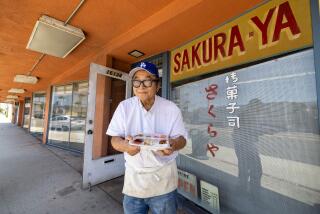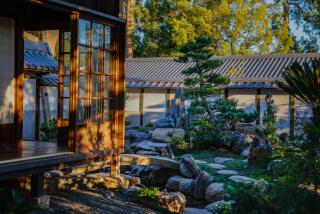14-Century-Old Japanese Firm’s Longevity Secret: Sticking to Basics
- Share via
OSAKA, Japan — The Kongos know a thing or two about running a business.
They should. Kongo Gumi, the family’s construction firm in western Japan, has been a going concern for more than 14 centuries, spanning 40 generations and surviving feudal wars and the more recent collapse of the nation’s economic bubble.
In an economy that seems stuck in a terminal slump, the family firm thought to be the world’s oldest is a reminder that businesses can survive almost anything if they have focus -- and if the potential CEOs avoid life-threatening risks.
“Since I was the only child, my parents often told me not to die young,” said Masakazu Kongo with a laugh. He succeeded his father as head of the Osaka-based company last September.
“When I told them I wanted to do skydiving, they said, ‘No way.’ ”
In his office, the 54-year-old tried to unfurl a scroll showing the family tree. It proved too long for his arms to manage.
When his ancestors started building temples for the Japanese emperor in 578, Europe was mired in the Dark Ages barely a century after the fall of the Roman Empire, and Japan was still more than a millennium away from opening up to the West.
Family Business magazine recently identified Kongo Gumi as the oldest family firm, and it has applied to the Guinness Book of Records.
The first Kongo-built Shitennoji, one of Japan’s first Buddhist temples, is in Osaka, and the company still serves as its chief carpenter, handling repairs almost exclusively.
Echoing the advice of many a management guru, the current chief executive said there was no real mystery to the firm’s success -- just a consistent focus on its core business.
“People always ask me, “What’s the secret?’ ” Kongo said. “But there really isn’t anything in particular. All we did was concentrate on our core business.
“Put simply, it’s all about sticking to the basics.”
Just as it did in 578, the firm specializes in building traditional Buddhist temples and Shinto shrines, although it has branched out somewhat into general contracting.
“We must always live as miyadaiku,” Kongo said, using the Japanese word that means literally “shrine carpenter.”
There are no textbooks to teach miyadaiku how to construct their complex wooden frameworks. The skills are passed through an apprenticeship-like system, under which younger carpenters “learn and steal” the trade from the master.
“The skills are like an intangible cultural asset, so we feel a great responsibility and a need to pass it on to younger generations,” said Masahito Kajigaki, a Kongo manager, as a team of carpenters chiseled away at lumber for a Buddhist temple roof.
According to an 8th century chronicle considered to be Japan’s oldest written history, the first Kongo came to Japan from what is now South Korea and remained in the country at the request of Emperor Yomei.
Kongo’s architectural skills were deemed vital for Japan, which at the time was importing technology from the more advanced China and Korea.
But expertise with wood is not the only thing that has brought Kongo Gumi this far. The firm was one of the first to use concrete to build traditional Japanese architecture and also to apply computer-aided design, Kongo said.
“We make use of the latest technology along with our long expertise to maintain the beauty of traditional Japanese architecture,” he said, patting what appears to be a wooden pillar in one of the many temples in Shitennoji. “This is actually made of concrete,” he said. “The point is how to make it look authentic.”
Most of the buildings of the Shitennoji now are concrete, after being burned down countless times amid feudal fighting and, later, U.S. bombing during World War II.
The firm has been profitable for as long as employees can remember, racking up sales of $80 million in its 2001 fiscal year.
Looking every bit the modern CEO in a designer suit and with a constantly buzzing mobile phone, Kongo is confident the company will be around for “another while,” partly because the elder of his two daughters is willing to take over as boss one day.
As advice for struggling businesses, Kongo said the important thing was self-belief.
“Everybody may be fretting about the recession, how tough times are, but you shouldn’t be overwhelmed by all the gloom. Believe in your business and stick to it.”
More to Read
Inside the business of entertainment
The Wide Shot brings you news, analysis and insights on everything from streaming wars to production — and what it all means for the future.
You may occasionally receive promotional content from the Los Angeles Times.









